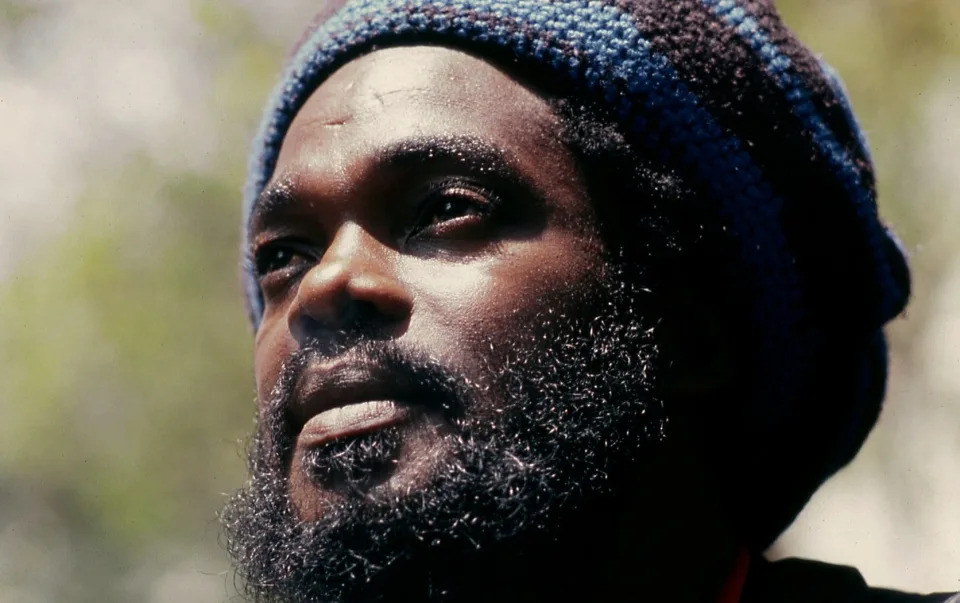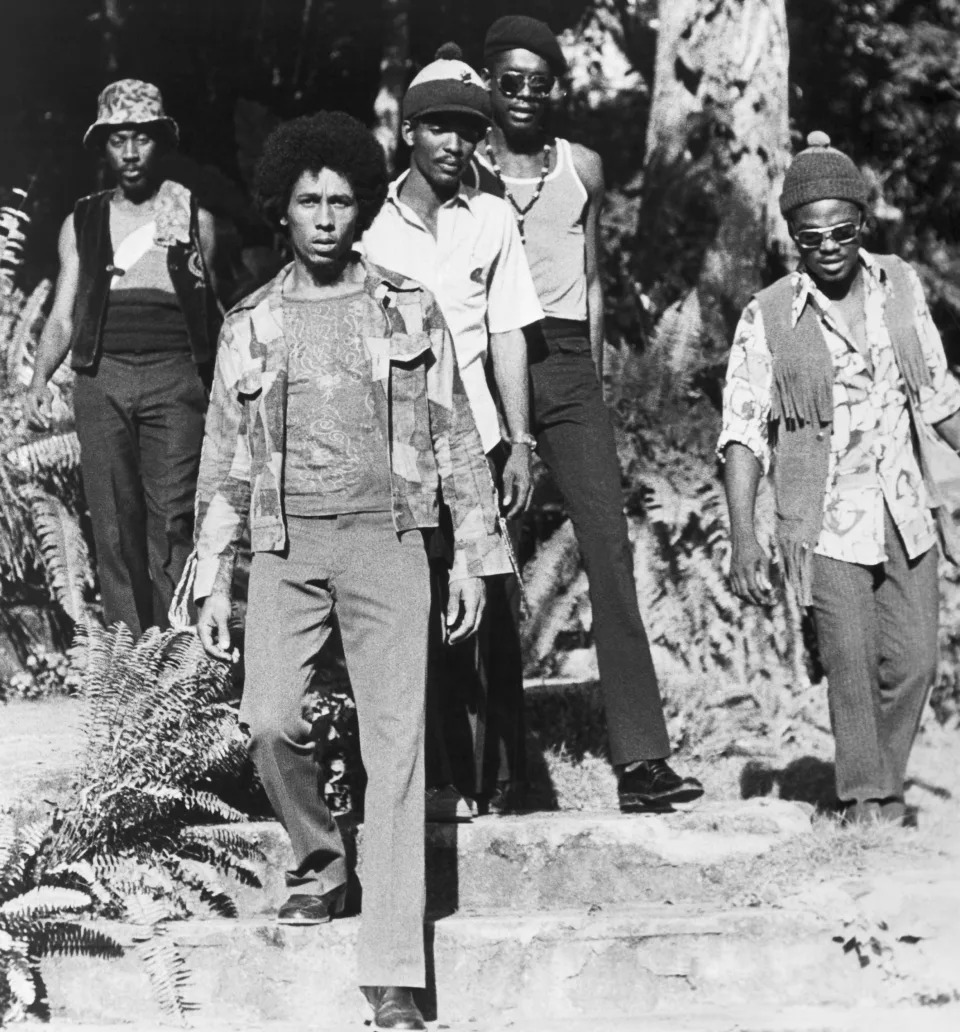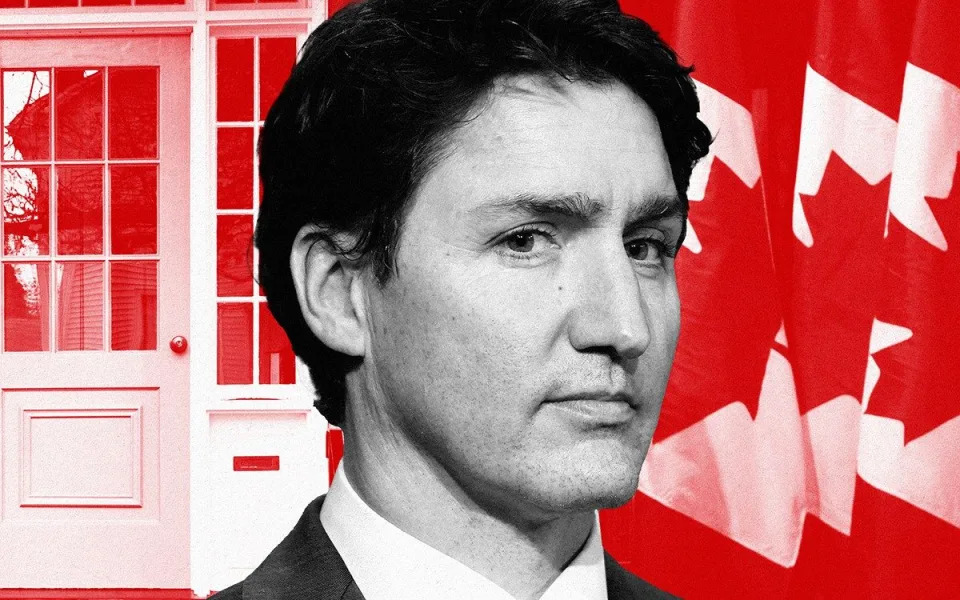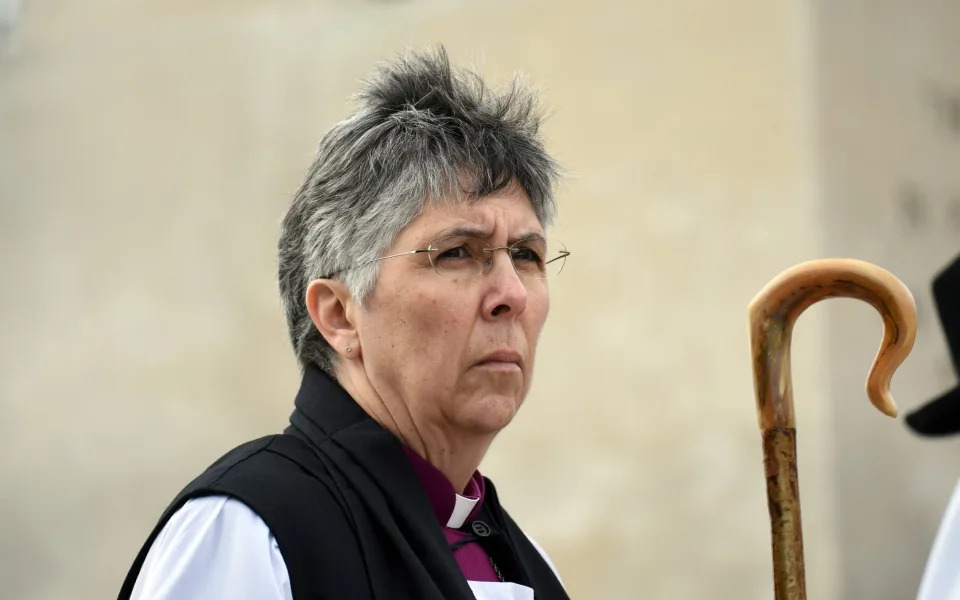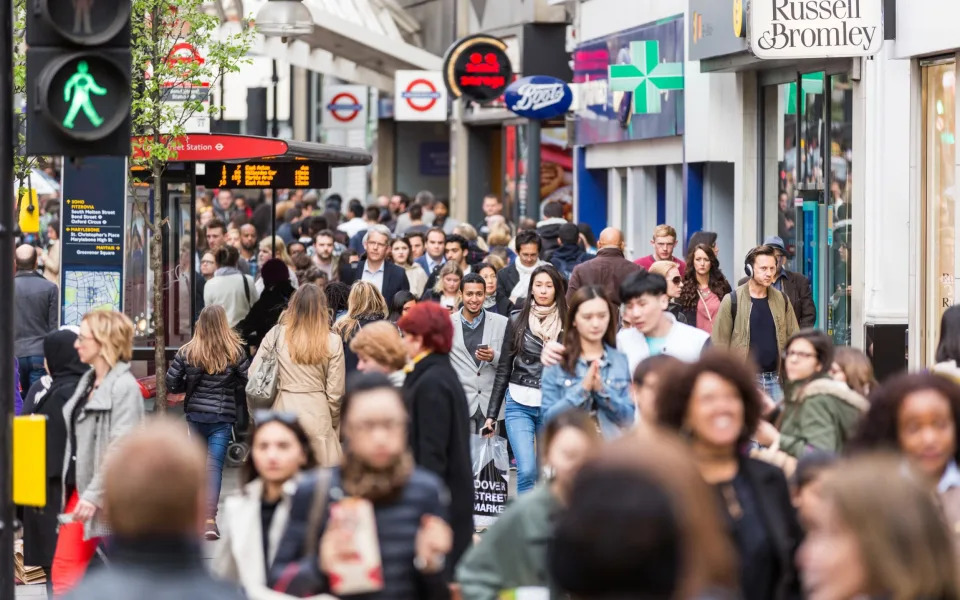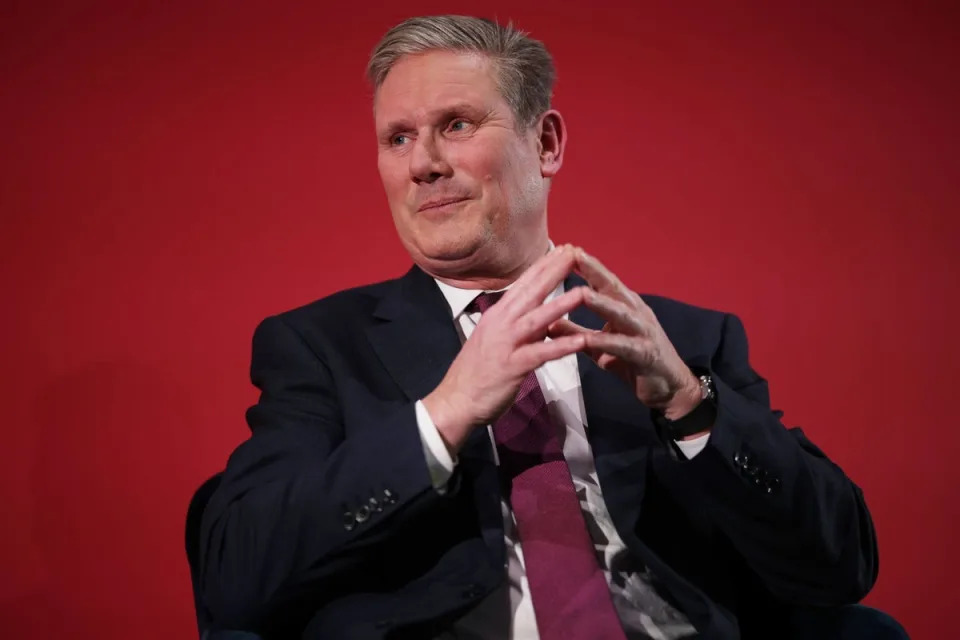FARAI MUTSAKA and SONJA SMITH
Updated Sun, February 4, 2024
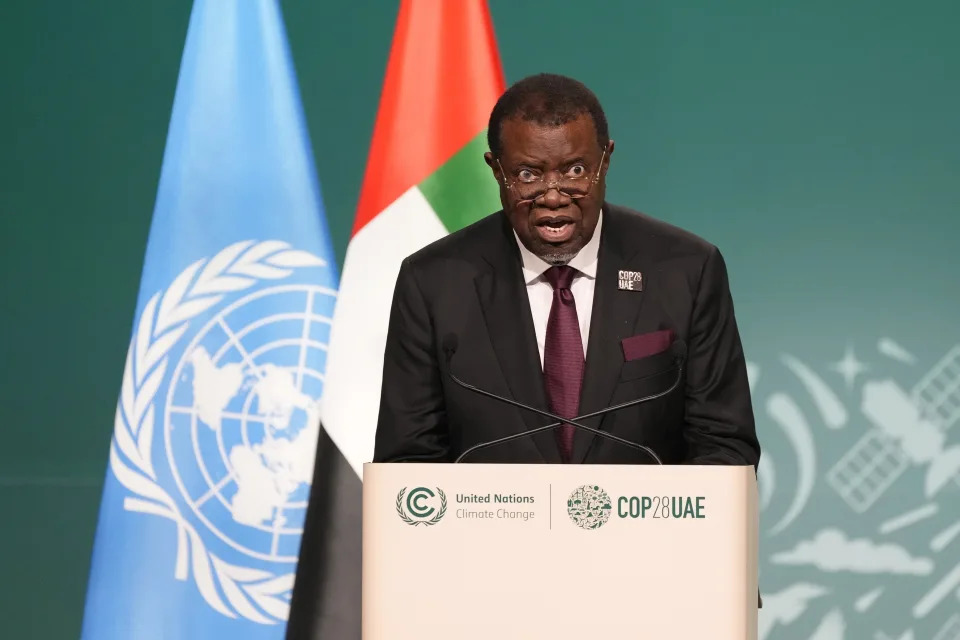
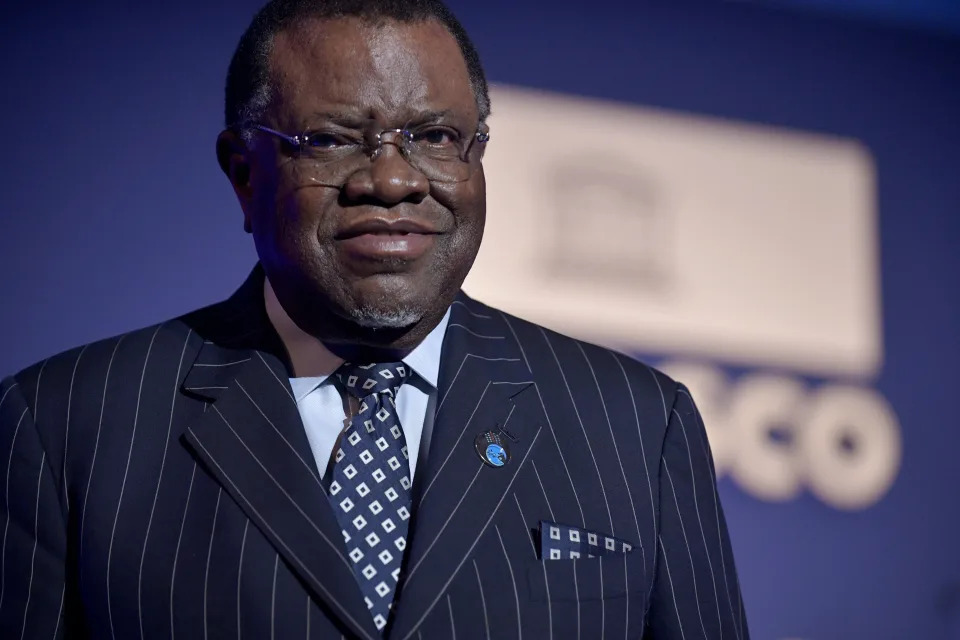
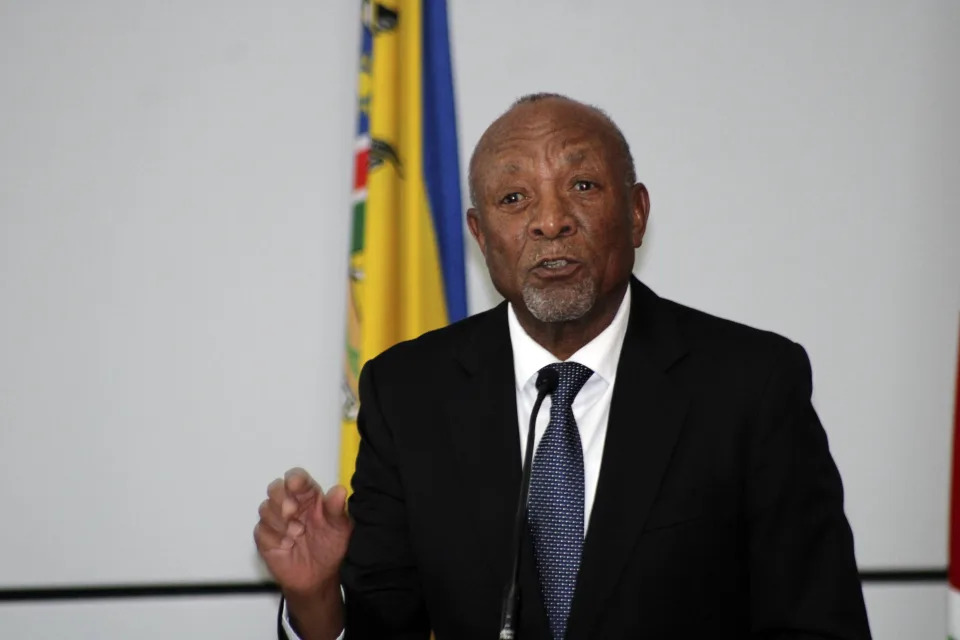
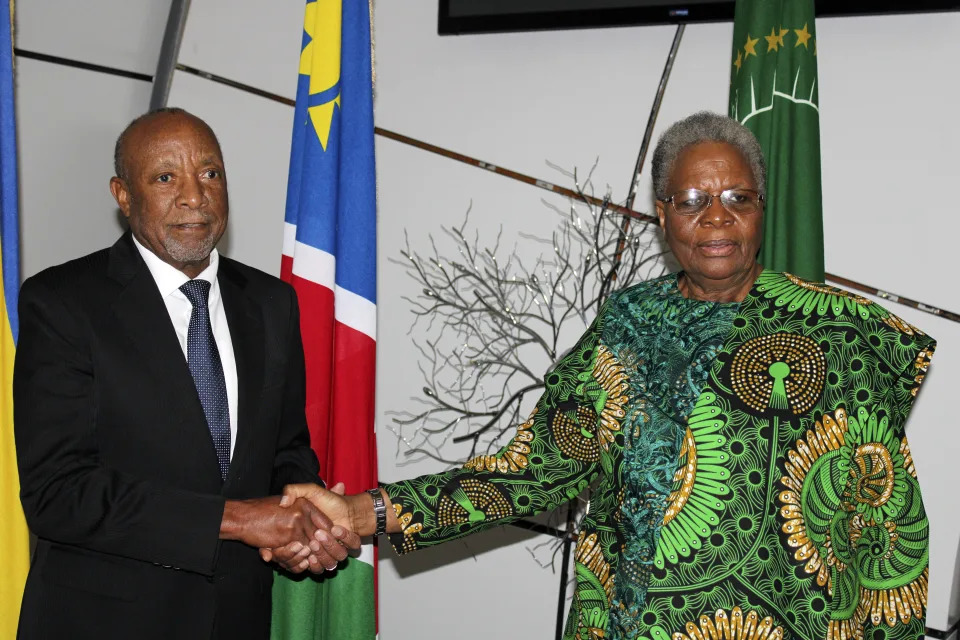
Newly sworn in Namibian acting president Nangolo Mbumba, left, shakes hands with Netumbo Nandi-Ndaitwa, his deputy, after taking the oath of office in the capital, Windhoek, Sunday, Feb, 4.2024.Namibia, one of Africa's most stable democracies, Sunday swore in a new leader hours after the death of the country's president Hage Geingob. Geingob died while receiving medical treatment at a local hospital, his office announced.(AP Photo/Ester Mbathera)
WINDHOEK, Namibia (AP) — Namibia's president and founding prime minister Hage Geingob died Sunday at age 82 while receiving treatment for cancer, and the southern African nation quickly swore in his deputy to complete the term in office.
Geingob played a central role in what has become one of Africa's most stable democracies after returning from a long exile in Botswana and the United States as an anti-apartheid activist. He was the country’s third president since it gained independence in 1990 following more than a century of German and then apartheid South African rule.
He had been president since 2015 and was set to finish his second and final term this year. His deputy, Vice President Nangolo Mbumba, was sworn in as acting president in the capital, Windhoek, to complete the term as allowed by the constitution.
Elections are set for November. A government statement said Mbumba will lead Namibia until Mar. 21 of next year, when the winner takes office.
The presidential office said Geingob died in a local hospital with his family by his side. He had returned to Namibia last month from the United States, where he underwent a trial two-day “novel treatment for cancerous cells,” according to his office. In 2014, he said he had survived prostate cancer.
Soft-spoken but firm on advancing Africa’s agenda as an important stakeholder in world affairs — “the exclusion of Africa from the Security Council is an injustice,” he once said in a United Nations address — Geingob maintained close relations with the U.S. and other Western countries but also, like many African leaders, forged a warm relationship with China and other powers.
Russian President Vladimir Putin was among the leaders who sent condolences Sunday, saying he would “forever cherish” his memories of meeting Geingob. “It is difficult to overestimate his personal contribution to developing friendly relations between Namibia and Russia," a statement said.
Geingob hosted U.S. first lady Jill Biden last year as she visited ahead of what had been an expected trip to Africa by her husband in 2023. That didn’t take place.
Namibia, with just over 2.5 million people, is rich in minerals such as diamonds, gold and uranium. Despite being classified as an upper-middle-income country, socioeconomic inequalities are still widespread, according to the World Bank.
The nation on the southwestern coast of Africa enjoys political and economic stability in a region that has long seen conflict and disputed elections. Namibia's opposition criticized Geingob last year for endorsing disputed elections in Zimbabwe.
But opposition leader McHenry Venaani paid tribute on Sunday.
“Indeed, President Geingob’s passing is a great loss not only to Namibia, but to the African continent as a whole," Venaani said. “Such was the caliber of this master negotiator and statesman, a lighthouse of steadfast leadership in turbulent times.”
Geingob, who was Namibia’s first prime minister from 1990 to 2002 and served in the same capacity from 2008 to 2012, could be outspoken on issues at home and abroad. In January, he criticized former colonial master Germany for supporting Israel after South Africa filed a case against Israel at the International Court of Justice accusing it of genocide against Palestinians in Gaza.
“Germany cannot morally express commitment to the United Nations convention against genocide, including atonement for the genocide in Namibia, whilst supporting the equivalent of a holocaust and genocide in Gaza,” Geingob said.
He was referring to events between 1904 and 1908 when colonial security forces in Namibia killed tens of thousands of people while putting down an uprising. Germany in 2021 acknowledged that the actions amounted to genocide and pledged more than $1 billion for infrastructure projects in the country.
Condolences from African leaders poured in on Sunday.
South African President Cyril Ramaphosa described Geingob as “a towering veteran of Namibia’s liberation from colonialism and apartheid.”
Kenyan President William Ruto said Geingob “strongly promoted the continent’s voice and visibility at the global arena.”
Zimbabwe's President Emmerson Mnangagwa posted on X that Geingob’s “leadership and resilience will be remembered.”
___
Mutsaka reported from Harare, Zimbabwe.
___
AP Africa news: https://apnews.com/hub/africa
Berlin honours 'path of reconciliation' taken by late Namibian leader
DPA
Sun, February 4, 2024
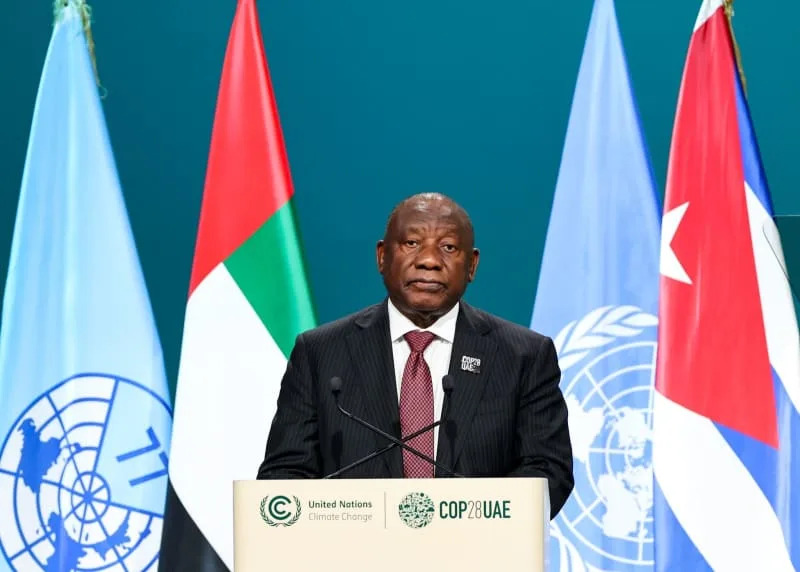
South African President Cyril Ramaphosa speaks at the G77 + China Leaders’ Summit during the United Nations Climate Change Conference (COP28).
Mahmoud Khaled/COP28/dpa
German President Frank-Walter Steinmeier paid tribute to the late president of Namibia as a formative statesman for his country after Hage Geingob's death on Sunday.
Against the backdrop of German colonial crimes a century ago in what is now Namibia, Steinmeier said that Geingob had taken a path of reconciliation with Germany "despite the heavy burden of our history."
Germany remains "committed to the path of reconciliation with Namibia and to coming to terms with the genocide perpetrated by Germany," Steinmeier said.
Geingob was Namibia's third president and had been in office since 2015. He was one of the leading political figures in the country for decades and played a decisive role in gaining Namibia's independence in 1990.
Under the presidency of Sam Nujoma, he served from 1990 to 2002 as the first prime minister of independent Namibia. Geingob campaigned for reconciliation and the reconstruction of the former German colony with a population of 2.6 million.
The German Empire was the colonial power in what was then called German South-West Africa from 1884 to 1915 and brutally put down rebellions.
The mass murders committed by German forces during the Herero Wars between 1904 to 1908 are now considered the first genocide of the 20th century. Historians estimate that 65,000 out of 80,000 Herero and at least 10,000 out of 20,000 Nama were killed during that time.
"Namibia has lost a great and influential statesman," Steinmeier wrote in a letter of condolence to Geingob's widow.
He recalled Geingob's decades-long struggle for "the liberation of Namibia from the yoke of apartheid."
German Chancellor Olaf Scholz also expressed his condolences and stated that Germany was losing "a partner who was committed to the process of coming to terms with Germany's colonial history with great openness."
"Just three months ago, we spoke on the phone about the progress of the reconciliation process and he was full of hope about the successful conclusion of the Joint Declaration," Stenmeier said.
In 2021, Germany recognized the crimes as genocide and the two governments have long been negotiating a proposed reconciliation agreement.
However, the reconciliation agreement and Germany's planned payments of €1.1 billion ($1.1 billion) for development projects in Namibia are currently on hold.
Berlin refuses to negotiate directly with the descendants of the victims of the time about personal compensation. Instead is negotiating with the Namibian government, reasoning that it represents the whole of Namibia under international law.
The aid money is slated for development projects in the Herero and Nama territories.
Other leaders paid tribute to Geingob, who died in the early hours of Sunday morning at the age of 82. He had been treated in hospital for cancer.
South Africa's President Cyril Ramaphosa said Namibia had lost an "extraordinary leader" "President Geingob was a towering veteran of Namibia’s liberation from colonialism and apartheid," he said in a statement.
Referring to Namibia's support during the South African freedom struggle against the white minority government there, he added that Geingob was "also greatly influential in the solidarity that the people of Namibia extended to the people of South Africa so that we could be free today."
South Africa is grateful to Geingob and saddened by his death, Ramaphosa added.
German President Frank-Walter Steinmeier paid tribute to the late president of Namibia as a formative statesman for his country after Hage Geingob's death on Sunday.
Against the backdrop of German colonial crimes a century ago in what is now Namibia, Steinmeier said that Geingob had taken a path of reconciliation with Germany "despite the heavy burden of our history."
Germany remains "committed to the path of reconciliation with Namibia and to coming to terms with the genocide perpetrated by Germany," Steinmeier said.
Geingob was Namibia's third president and had been in office since 2015. He was one of the leading political figures in the country for decades and played a decisive role in gaining Namibia's independence in 1990.
Under the presidency of Sam Nujoma, he served from 1990 to 2002 as the first prime minister of independent Namibia. Geingob campaigned for reconciliation and the reconstruction of the former German colony with a population of 2.6 million.
The German Empire was the colonial power in what was then called German South-West Africa from 1884 to 1915 and brutally put down rebellions.
The mass murders committed by German forces during the Herero Wars between 1904 to 1908 are now considered the first genocide of the 20th century. Historians estimate that 65,000 out of 80,000 Herero and at least 10,000 out of 20,000 Nama were killed during that time.
"Namibia has lost a great and influential statesman," Steinmeier wrote in a letter of condolence to Geingob's widow.
He recalled Geingob's decades-long struggle for "the liberation of Namibia from the yoke of apartheid."
German Chancellor Olaf Scholz also expressed his condolences and stated that Germany was losing "a partner who was committed to the process of coming to terms with Germany's colonial history with great openness."
"Just three months ago, we spoke on the phone about the progress of the reconciliation process and he was full of hope about the successful conclusion of the Joint Declaration," Stenmeier said.
In 2021, Germany recognized the crimes as genocide and the two governments have long been negotiating a proposed reconciliation agreement.
However, the reconciliation agreement and Germany's planned payments of €1.1 billion ($1.1 billion) for development projects in Namibia are currently on hold.
Berlin refuses to negotiate directly with the descendants of the victims of the time about personal compensation. Instead is negotiating with the Namibian government, reasoning that it represents the whole of Namibia under international law.
The aid money is slated for development projects in the Herero and Nama territories.
Other leaders paid tribute to Geingob, who died in the early hours of Sunday morning at the age of 82. He had been treated in hospital for cancer.
South Africa's President Cyril Ramaphosa said Namibia had lost an "extraordinary leader" "President Geingob was a towering veteran of Namibia’s liberation from colonialism and apartheid," he said in a statement.
Referring to Namibia's support during the South African freedom struggle against the white minority government there, he added that Geingob was "also greatly influential in the solidarity that the people of Namibia extended to the people of South Africa so that we could be free today."
South Africa is grateful to Geingob and saddened by his death, Ramaphosa added.

Hage Gottfried Geingob, President of Namibia, speaks at a meeting with Germany's Minister of Economics Habeck and business representatives at State House.
Bernd von Jutrczenka/dpa
